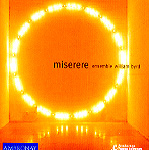This Allegri Miserere will come as a shock to listeners familiar with the more or less “standard” version of this perennially popular work. Of course the standard version exists in several forms, all of which are some kind of composite of Allegri’s efforts with later insertions by others. What you will hear on this recording–and if you have the slightest interest in sacred choral music, you will hear it–is the version as it exists in a “long overlooked and once-secret manuscript in the Vatican library”, prepared by the Papal choir’s last maestro, Domenico Mustafà, in 1892, some 22 years after the famous Cappella Sistina’s demise in 1870.
The score includes Allegri’s florid chants (presumably written in the 1630s) along with those of Tommaso Bai, who wrote his own Miserere in 1714, a setting that was immediately added to the Papal choir’s sequence of three Misereres, sung during Wednesday, Thursday, and Friday of Holy Week. Over time the Allegri and Bai were combined into one grand, glorious piece–but in this current version, even the Allegri sections are different from what we usually hear, and when mixed with the surprising colors, dissonances, and ornaments of Bai’s version, we’ve got a completely new piece–and it’s a gem.
The French vocal group Ensemble William Byrd performs the work with nine unaccompanied voices–five in one choir, four in the other–and the effect is stunning both in terms of the ardent, intense expression of the text and mood and in the vibrant sound, ideally recorded in France’s l’Abbaye de Fontmorigny. It’s rare that we get to experience an old, too-familiar masterpiece in an entirely new light, and this is one such experience that shouldn’t be missed.
The other works on the disc include another masterpiece, but this one is undeservedly little-known–Leonardo Leo’s own setting of the Miserere (which is Psalm 50–or 51, depending on which Biblical text you’re using). Written nearly a century later than the Allegri version, it’s characterized by gorgeous, soaring melodic lines and rich-textured, closely-voiced harmonic treatments, interspersed with short chant sections. It’s performed with organ and eight voices divided into two choirs. The Ensemble William Byrd gives this the same involving, committed attention it lavishes on the Allegri, and all we can do when it’s over is press the repeat button.
Amazingly, this same work appears on a recently released disc devoted to works by Leo, performed by the Choir of Gonville and Caius College, Cambridge (ASV). The Cambridge choir’s rendition in its way is every bit as satisfying as this one–however the sound is more distant, warmer, and softer-edged, the interpretation less intense, more emotionally resigned. In comparison this Naïve disc gives a much closer perspective, resulting in more “buzz” to the harmonies and a more visceral impact to the ensemble singing. In fact, this is the kind of recorded choir sound that choral fans long to experience–one that brings you right into the performance by virtue of its clarity, immediacy, and the natural, true reproduction of the voices. No smooshing around with the inner parts, no muddy bass, no overly prominent soprano. This is great ensemble singing, expertly recorded. The Francesco Scarlatti (beautifully performed with strings and organ) and the Viadana (for two tenors and organ) are bonuses in an already unforgettable program. The notes by conductor Graham O’Reilly are excellent. Don’t miss this.
































